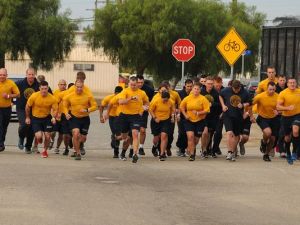In every military branch they have a physical fitness requirement. Upon entry into the military and at least annually (most often it is bi-annually) thereafter you are required to pass a physical fitness test which normally includes a cardiovascular portion (most often running but may be the elliptical or swimming) and a strength portion (push-ups, sit-ups, or in the case of the Marines, pull-ups). The regular tests are not too difficult to pass as long as you have a regular fitness routine, and this encourages a culture of fitness across the military.
Just like physical fitness is a basic requirement for military service, keeping the Sabbath day holy is a basic commandment from God. Sabbath day observance is like a regular spiritual fitness test that keeps us focused on our Heavenly Father and our Savior, Jesus Christ. A culture of Sabbath-day observance is an important part of the gospel.
Proper observance of the Sabbath has been a commandment from the beginning of time. “And on the seventh day God ended his work which he had made; and he rested on the seventh day from all his work…And God blessed the seventh day, and sanctified it” (Genesis 2:2-3). We read in the Old Testament about the Children of Israel and Manna. Everyday they were required to go out and collect Manna for food. If they tried to collect extra than what they needed (so they could be lazy the next day) they would wake up to find their left-overs full of worms. This was true on every day except the day before the Sabbath when twice as much Manna would come and they were told to collect twice as much so as to not have to collect Manna on the Sabbath. When they awoke on the Sabbath, the Manna they had collected the day before was still good and there was no Manna to collect (see Exodus 16:16-31). It seems like the Lord was teaching the Children of Israel about keeping the Sabbath day and then the commandment came: “Remember the sabbath day, to keep it holy.” (see Exodus 20:8-11). Both Nehemiah and Ezekiel later taught that part of the reason for the condemnation of the Children of Israel was because they failed to keep this basic commandment (see Nehemiah 13:15-22 and Ezekiel 20:12-16).
As history progressed we see this commandment repeated which is an indication of its importance. We have record in The Book of Mormon that they kept the Sabbath day (see Jarom 1:5 and Mosiah 18:23). During Christ’s mortal ministry He taught by word and example the importance of keeping the Sabbath day, not in the Pharisaical way of strict adherence to a rigid structure of rules and extreme limitations, but that we should be serving God and our fellow man on the Sabbath (see Matthew 12:10-13 and Mark 2:27 for example). Modern-day prophets have repeated the importance of keeping the Sabbath day holy. For example, President Spencer W. Kimball said, “The observance of the Sabbath is an indication of the measure of our love for our Heavenly Father.” (see “Chapter 16: The Sabbath–A Delight” from Teachings of the Presidents of the Church: Spencer W. Kimball). Just like the regular tests in the military are a test of physical fitness, the way we observe the Sabbath day is a regular spiritual test of our love and obedience to Heavenly Father, yet it still remains one of the most commonly broken commandments even among those who profess His name. “Wherefore the Lord said, Forasmuch as this people draw near me with their mouth, and with their lips do honour me, but have removed their heart far from me” (Isaiah 29:13).
So what are ways that we can keep the Sabbath day holy (what are ways in which we can prepare for and pass the spiritual fitness test)? There are many components to a good physical fitness program and there are many ways that you can keep the Sabbath day holy. One of the major ways we do this is by attending all of our meeting on Sunday and properly partaking of the Sacrament in a spirit of worship and repentance. The Savior Himself instituted the Sacrament among His disciples in Jerusalem (see Matthew 26:26-29; Mark 14:22-25; and Luke 22:19-20) and in the American continent among the Nephites (see 3 Nephi 18:1-13). In our day we have received the proper way of administering the Sacrament by Divine Revelation (see D&C 20:75-79 and D&C 27:1-4). Elder Dallin H. Oaks, one of the 12 Apostles in our day, has said this about the Sacrament, “The ordinance of the sacrament makes the sacrament meeting the most sacred and important meeting in the Church…I sense that some…have not yet come to understand the significance of this meeting and the importance of individual reverence and worship in it.” (see “Sacrament Meeting and the Sacrament” from the October 2008 General Conference). Some other words that Elder Oaks uses in his talk to describe the Sacrament are “quiet reverence,” “individual reverence and worship,” “a sacred act,” “a broken heart and a contrite spirit,” “highlight of our Sabbath observance,” “spiritual enrichment,” “commemorate our Savior’s death and suffering for the redemption of the world,” and “we can renew our covenants to serve Him, to obey Him, and to always remember Him.” Does this describe your experience with the Sacrament? How can you make it better? (some other good talks about the Sabbath and the Sacrament are from Elder L. Tom Perry, “As Now We Take the Sacrament” from the April 2006 General Conference and “The Sabbath and the Sacrament” from the April 2011 General Conference).
While the Sacrament should be the center of our Sabbath-day observance, we should spend the rest of the day in holy pursuits. President Spencer W. Kimball said, “I … would urge upon all Saints everywhere a more strict observance of the Sabbath day. The Lord’s holy day is fast losing its sacred significance throughout the world. … More and more, man destroys the Sabbath’s sacred purposes in pursuit of wealth, pleasure, recreation, and the worship of false and material gods. We continue to urge all Saints and God-fearing people everywhere to observe the Sabbath day and keep it holy.” and also “The Sabbath is a holy day in which to do worthy and holy things. Abstinence from work and recreation is important, but insufficient. The Sabbath calls for constructive thoughts and acts, and if one merely lounges about doing nothing on the Sabbath, he is breaking it.” (see “Chapter 16: The Sabbath–A Delight” from Teachings of the Presidents of the Church: Spencer W. Kimball). There are many good ways to spend the Sabbath and it is important to follow the Spirit as to how best utilize our time on this holy day. Some good suggestions include studying and teaching the gospel, strengthening your family in appropriate ways, writing letters and contacting your distant family, appropriate napping, genealogy and family history work, and serving others. In Exodus we read that the Sabbath is to be a “perpetual covenant” and a “sign” between us and the Lord (see Exodus 31:16-17). How we choose to observe the Sabbath day is a sign to the Lord of where our hearts are and how we honor our covenants. What are you showing the Lord by your actions and thoughts on this day? If we take this council to heart we will not need a list of dos and don’ts to govern our actions (see Elder Russell M. Nelson, “The Sabbath is a Delight” April 2015 General Conference). I want to point out that while we try to avoid working on the Sabbath as best we can, when we are required to do so it is still possible to keep the spirit of the Sabbath in your thoughts and actions (the same is true if you have a roommate who by the things they watch on television, the games they play, or the songs they listen to make it difficult to remember the importance of this day).
The military benefits greatly in a multitude of ways from their culture of fitness and similarly we benefit greatly in a multitude of ways from keeping the Sabbath day holy. Isaiah called the Sabbath a “delight” (see Isaiah 58:13-14). Elder James E. Talmage elaborated on this idea in his book Jesus the Christ when he said, “The observance demanded, however, was the very opposite of affliction and burden; the Sabbath was consecrated to rest and righteous enjoyment, and was to be a day of spiritual feasting before the Lord…The Sabbaths established by the Lord…were to be times of refreshing, relief, blessing, bounty, and worship.” (pages 204-205). In Leviticus we read that the Sabbath is a time of spiritual “celebration” (see Leviticus 23:32). “And that thou mayest more fully keep thyself unspotted from the world, thou shalt go to the house of prayer and offer up thy sacraments upon my holy day; For verily this is a day appointed unto you to rest from your labors, and to pay thy devotions unto the Most High” (D&C 59:9-10 see 8-19). There are many promised blessings from keeping the Sabbath day holy. Here is a list of the ones that I came across as I was preparing this talk: a joy and peace not found in the world, rest and renewal, strengthened faith, deepened understanding, increased resistance to temptation, feeling closer to the Lord, feeling closer to your families, help with maintaining an eternal perspective, increased spiritual strength, generating spiritual power, renewal of covenants, forgiveness of sins, assurance of knowing that you are well on the Lord’s side, “rain in due season”, “the land shall yield her increase”, we will “dwell in your land safely”, the Lord will make you “fruitful”, and will “walk” among us (see Leviticus 26:2-12), you will have increased access to the Spirit for direction and protection, your burdens will feel lighter, and you will have an increased ability to perform during the rest of the week.
The physical fitness test continues to be an important aspect of military life which divides those who are physically prepared from those who are not. Similarly, Elder Bruce R. McConkie said, “the matter of Sabbath observance remains … as one of the great tests which divides the righteous from the worldly…” (Mormon Doctrine, 2nd ed. (1966), 658). Let us pass this test and show our Heavenly Father our love for Him by obedience to this most basic commandment of keeping the Sabbath day holy.
In addition to the references listed above, for more information on this topic, please see:
- Elder Marcus A. Aidukaitis, “The Joy of Sabbath Observance,” Ensign December 2011
- Elder Kevin S. Hamilton, “Continually Holding Fast,” October 2013 General Conference
- Elder H. Aldridge Gillespie, “The Blessings of Keeping the Sabbath Day Holy” October 200 General Conference
- Elder James E. Faust, “The Lord’s Day” October 1991 General Conference
“Blessed are those who need no reasons other than their love for the Savior to keep his commandments” Elder James E. Faust

